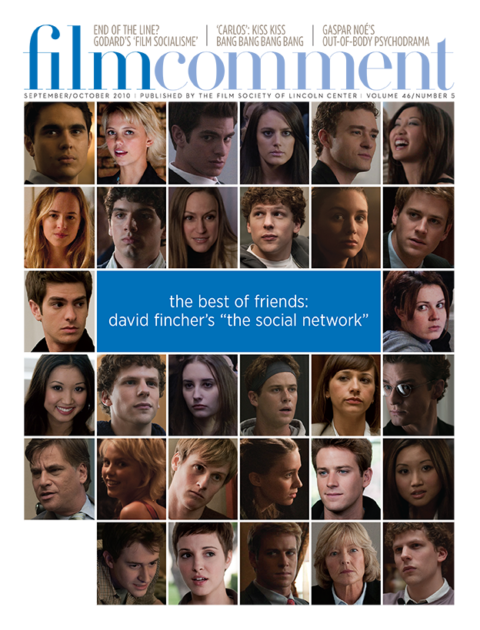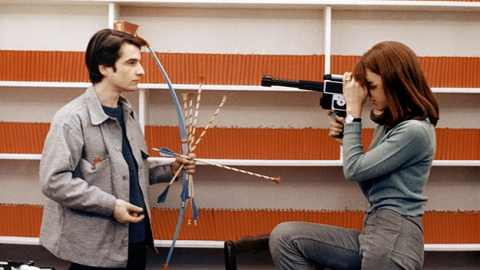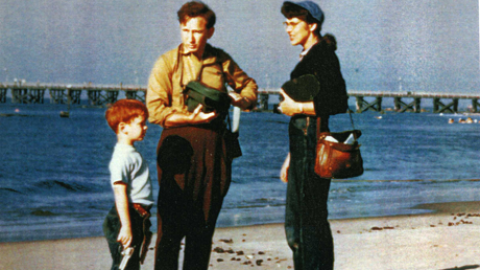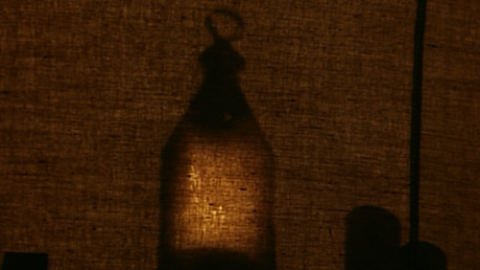By Amy Taubin in the September-October 2010 Issue

Wiping the Slate Clean
With Film Socialisme, Jean-Luc Godard embarks on an unsentimental journey—and asks “Quo Vadis?”
“These fragments I have shored against my ruins.”
—T.S. Eliot, The Waste Land

From the September-October 2010 Issue
Also in this issue
I think I’ve used this quotation before—perhaps in relation to Histoire(s) du cinéma—but it has never seemed as appropriate as it does now, applied specifically to the movie rumored to be the last by Jean-Luc Godard, Film Socialisme. But if indeed this is an ending, it is not a summation. The phrase des choses comme ça (“things like that”) is repeated throughout. This is the work of art as provisional, approximate, relative—not ideal. And so, here are some things—pitifully few—about des choses comme ça as chosen by Godard in what might or might not be his last film.
(A note about viewing circumstance: absent from Cannes this year, I missed the opportunity to see Film Socialisme projected on the big screen, Godard’s preference, according to one of several interviews he gave prior to the premiere. What follows is based on DVD viewing—useful for analysis, less than satisfactory as cinematic experience.)
Film Socialisme is a movie in three movements, their relationship, particularly in terms of tempo and the statement and recapitulation of themes, corresponding more or less to classical sonata form: a fast-paced first movement, a slow second, and a third that is faster and shorter than the first. The opening movement takes place on a huge ocean liner cruising the Mediterranean, with brief side trips in various ports of call. The second movement is confined to a small house and an adjacent gas station somewhere in the south of France. The third recapitulates the Mediterranean journey of the first, depicting places where what Godard terms “our humanities” were born—Egypt, Palestine, Odessa, Hellas (i.e. Greece, hélas), Naples, Barcelona—largely by scavenging through banked images of 20th-century horror.
This is the first feature-length movie that Godard has made entirely on video. While he has often fashioned a dialectic with film and video, here the kinetic montage of the cruise ship section is created through abrupt juxtapositions (straight cuts, relatively little overlapping sound) of high- and low-tech digital. Four principal cameramen, Godard among them, are credited, and they seem to have wielded every variety of video camera from cell phone to state-of-the-art HD. The chaotically pulsing pixels and overly saturated, smeared colors of the low-tech images result in busy, garish near-abstractions, and when they collide with the high-tech images—hyperreal, flattened fields of fauve blues and yellows, bisected and trisected like lessons in geometry or, in the case of the overhead shots of the sea, filling the entire screen with eddies and waves of blues and whites—the visual drama is extraordinary. All is representation, but not all representation is equal. It is the breathtaking HD images that prove Godard as much a master colorist in digital media as he has been in celluloid.
Generous as the movie is with visual beauty, it is equally withholding of linguistic meaning. The cruise ship is a floating Las Vegas. Godard cites Fernand Braudel’s great history of the Mediterranean as a source, but one might also think of Venturi, Brown, and Izenour’s pivotal 1972 text on postmodernism, Learning from Las Vegas. The several thousand actual passengers on the cruise liner commandeered by Godard function, unwittingly, as “extras.” They are making a putative tour of the roots of Western civilization as a way of escaping the pressures of capitalism in its final throes. They eat, drink, gamble, exercise, pray, and watch movies together, and they constantly record their activities with all manner of cameras. As far as one can discern, they never look at what they’ve recorded, and they are seldom seen engaged in conversation. At one point, the philosopher Alain Badiou is shown lecturing on geometry and philosophy to an empty auditorium. (Godard explained in an interview that he placed an announcement of the lecture in the ship’s daily activities calendar, but no one came.) One interpretation of the movie’s title, which remains “obscure” (to use one of Godard’s favorite words) to the very end, is that the artificial community formed aboard the boat, solely for the purpose of R&R, is incapable of entertaining the possibility of socialism because they can neither communicate with one another nor reflect on themselves or the reflections of themselves they mindlessly produce.
The fragmented text—which largely consists of non sequiturs, gnomic pronouncements, chains of associations broken off before they’ve barely begun—is spoken by about a dozen actors, posed in various parts of the ship, their voices often masked by the sounds of wind whistling across unshielded microphones, the cacophony of the passengers, and bursts of music. The actors present themselves less as characters than as familiar Godardian mouthpieces and archetypes: the war-criminal hunter, the Jewish banker, the young woman accompanying the powerful and much older man, the serious young African who says she doesn’t want to die until she sees Europe happy, and another serious young woman who says the same about Russia. Good luck to those last two. In response, Godard throws the Latin title “Abii Ne Viderem” (“I departed lest I see”) in block letters across the screen. Most of the film’s text is in French with a smattering of German, Russian, Arabic, Hebrew, Latin, and Greek. For the Cannes screening, Godard added subtitles in what he termed “Navajo English” at the bottom of the frame, which were as unhelpful as they were meant to be. If you are fluent in French, you may think you have an advantage, but you don’t because this is a film about the failure of language and meaning. Indeed, the pair of parrots in the opening, pre-credit image—their iridescent feathers a hint of visual splendors to come—and the pair of cats, meowing in unison in a YouTube video that we see slightly later, communicate far better with each other and with us than do the humans. And yet, in a movie that went into production four years ago, Godard, ever the Cassandra, makes glancing references to the global financial meltdown, the economic crisis in Greece, the destruction of the waterways by deep-sea drilling, and more. Nothing in Film Socialisme, however, has the clarity and wit of Godard’s argument that if you believe in intellectual property rights, then logically the entire Western world owes a thousand billion dollars to Greece—for Pericles, Sophocles, and Aristotle—rather than Greece owing Europe anything at all. Which is to say that despite the visual pyrotechnics of the first section, the mood is ominous and despairing. How could it be otherwise?
The title “quo vadis europe” is the segue from the first to the second section, in which we find ourselves in the modest home of the Martin family—father, mother, 10-year-old boy, and teenage girl. The Martins keep a llama on a painfully short leash, tethered in front of their gas station, along with the llama’s donkey sidekick. Otherwise they seem like nice people. The wife’s decision to run for local office brings a two-person TV crew to their door. There are echoes of Wind from the East (70) and, in the insistence on putting children first, the television series France/tour/détour/deux/enfants (77). After the razzle-dazzle of the opening movement, the extended fixed-camera positions of this adagio section seem a bit too grounded, until a shot in which the boy is holding onto his mother as she washes the dishes. Their bare arms seem illuminated as in a de la Tour painting, the flesh made light—an HD miracle indeed. The boy then sits on a couch alone, scratching his arm as if to confirm its corporeality. Part of the slow movement of a Beethoven piano sonata plays on the radio, then a bit of Chet Baker, then a political debate. Gradually you might realize that these scenes of rare tenderness and exquisite beauty are fragments of a portrait of the filmmaker as a young boy, an idea confirmed somewhat later during a scene in which the boy sits on an outdoor staircase, painting an early Renoir from memory. (Braudel wrote the first volume of his history of the Mediterranean from memory during the years he spent in a German prison camp.) The TV reporter, a stunning African woman, asks the boy what he’s thinking about and he answers, “Your ass.” “Does that really interest you?” she asks, to which he answers, “No comment.” “No comment,” written in large letters, are also the words that conclude the film. They come at the end of the third movement, which reiterates the Mediterranean journey of the first in the form of a montage of footage of the horrors of the 20th century. That we’ve seen this film before is precisely the point. It is the unsparing proof of Freud’s theory of the death instinct and repetition compulsion. Godard revisits footage of wars and atrocities, including his own reedit of Eisenstein’s Odessa Steps sequence. When he slams the door on Film Socialisme with two words, first spoken as a joke by a cheeky boy (English, it turns out, is good for something), it comes as a relief.
“No comment” is a shifter, referring back not only to this enigmatic, painful, off-putting, ravishing Film Socialisme—but to all the Godard films that preceded it. Yet one can’t help but feel that it also refers to what is to come, especially since the few seconds of black that follow the title give way to an empty field of white. Black signifies nothing; white makes one think about what nothing means. Is this a last film? Godard claims he has given up his production studio and is in the process of dismantling his library of videos and books, making it likely that this film brings to a close at last his extended raids on the image bank. But he has also hinted at starting again from zero “with a pencil camera and three photos.” Interviewing himself for the press book that accompanied the Cannes screening, he queries, “A last film?” The reply: “Only the title, Farewell to Language.”
But is that not the movie I’ve just described?






